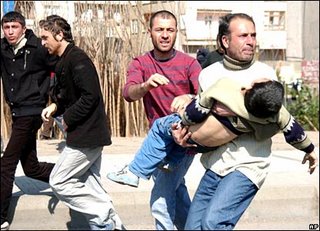Coalition Forces and Iraqi Obligations towards Protecting Kurdistan
May 1, 2006
KurdishAspect.com
By Eamad Mazouri
USA {KurdishAspect.com} May 1, 2006 - Ever since the overthrew of dictator Saddam’s regime and the new found liberties and freedoms Iraqi people in general have enjoyed for the first time in their modern history, as well as the turmoil and chaos the country has witnessed following that, the majority of the Iraqi people and their representatives have come to the conclusion that no political group or faction alone is capable to form a viable government without approaching others and engaging them to create a national consensus to build a national unity government. In fact, the Iraqi democratic experience is unique in this regard. For any government in Baghdad to succeed, it needs to move toward all the other elements and factions to build a national coalition, hence reflecting truly the mosaic texture of the Iraqi society as a whole. A general consensus has become absolutely necessary without which no government can do well in Baghdad. It is unique in terms that this government has to be inclusive of the Shiites, Kurds, Sunnis and the rest of the Iraqi ethnic and religious groups who make up the fabric of the Iraqi society despite the outcome of the general election as it has been the case in last few national elections, although constitutionally, two or more groups might command enough vote and seats to be eligible to form a government. In the Iraqi elections, while important for each group the number of seats they win in Parliament, nothing could be accomplished without the engagement of all parties or at least the majority of them. The reason behind that is the fact that general consensus is the key to form a national unity government that would actually be able to function properly and successfully. Fortunately, the very first indications now are that Iraqi leaders have learned their lessons and are thinking along those lines despite the differences amongst them on details. The actions of the new Iraqi government should reflect this concept on all aspects including the protection of its territory against outside aggression.
The Kurd's Obligations and Rights towards Iraq
The Kurds, on the other hand, have come along way to reintegrate and rejoin Iraq after almost 15 years of self-rule where they have enjoyed their own government, elected parliament and all the state institutions necessary to run their own affairs successfully. Like we said one of the major reasons behind their conviction on the federal solution was to benefit from the safeguard a sovereign Iraq could provide them with when it is needed. This is an essential element implied if not expressed in the contract of the voluntary union the Kurds have entered in with Iraqi state.
Most of the unbiased and objective political observers would agree that Kurds in Iraq while were being accused of separatist tendencies by their adversaries on national and regional levels, have indeed became the safety tap of Iraq and the main ingredient of its unity. Their leaders are playing a major role in keeping the country together, creating a general consensus among Iraqis, building a national unity government, contributing to the security and stability of the country, and combating fundamentalism and terrorism.
Today, Iraqi people have finally come to the conclusion to set up such a government. At the same time the Kurds themselves have resolved their differences and agreed to form a regional unity government in Kurdistan. In the midst of all these positive achievements, some irresponsible radical elements who are perhaps acting on behest of others or are dancing on the tunes of some regional powers are taking some dangerous strides inside the country along the flash points areas such as Kirkuk. It is no surprise that these suspicious moves are coinciding with the mass of foreign troops by both neighboring countries Turkey and Iran under various pretexts along the borders with Iraqi Kurdistan.
Kurdistan President Mr. Massoud Barzani has repeatedly reiterated the position of Kurdistan government on the issue of Kurdish rights within these countries and the way the Kurds should lead their struggle.Mr. Barzani maintains that Kurds are not a minority, but a divided nation against its will. Therefore, they have the right to self-determination, including having a homeland like any other nation.
However, in Iraq a true and democratic federalism based on a “voluntary union” has been chosen of the Kurd's free volition as the best way to resolve the Kurdish problem. His message to the Kurds in other parts has been to avoid violence and resort to peaceful means as the only viable method to secure their rights.
Overall, the Kurds and their regional government have performed their role the best they could and satisfied their responsibilities as Iraqi Nationals and Kurdistan as a federated constituent of the federal Iraqi government as the constitution provides.
Now Kurdistan is threatened by foreign armies that according to Newsweek, International Edition “have last week, according to angry Foreign Ministry officials in Baghdad, Turkish commandos briefly crossed 15 kilometers into Iraqi territory”. While Kurds and their government are perfectly capable to defend their people and territory, United States of America, Britain and other coalition forces and according to international norms, UN charter and accords of occupation, are under the obligation to prevent further aggravation of the situation on Iraqi borders. Also, and most importantly, the Iraqi government should fulfill its commitment in protecting and preserving its territories by playing its role as a sovereign state to put off such a crisis, guard Kurdistan and employ all its resources to thwart any attempts to further exacerbate situation and turn the only stable, secure, secular part of Iraq which is Kurdistan into chaos, violence and uncertainty.

